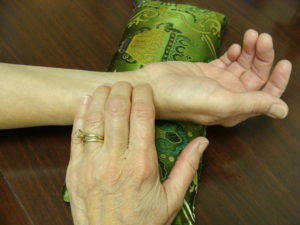One of the hallmarks of diagnosis in Chinese medicine is pulse taking. A good acupuncturist or practitioner of Chinese medicine can gather a lot of information just from feeling the pulse at your wrist (also called your radial pulse for the bone it lies near). There have been countless times when I felt pretty sure of my initial diagnosis of a patient’s condition—until I felt their pulse, which told an entirely different story.
 When you go to your Western doctor, they usually take your pulse. However in most cases, they’re just documenting its rate; an indication of how fast your heart is beating. A practitioner of Chinese medicine will tell you that feeling a patient’s pulse can give your far more intel on their condition beyond heart rate. Here are a number of things you may find surprising about Chinese pulse reading:
When you go to your Western doctor, they usually take your pulse. However in most cases, they’re just documenting its rate; an indication of how fast your heart is beating. A practitioner of Chinese medicine will tell you that feeling a patient’s pulse can give your far more intel on their condition beyond heart rate. Here are a number of things you may find surprising about Chinese pulse reading:
-To be sure, Chinese practitioners also feel your pulse for rate. However, in Chinese medicine your pulse rate is more than a number. It’s measured in relation to your respiration. A normal pulse is four to five beats per breath (inhalation and exhalation). In addition, the rate of your pulse is an indicator of your body temperature. A faster than normal pulse is an indicator of heat in your body, which can come from fever, infection, or inflammation. A slow pulse suggests internal cold or too much of a cool pathogen such as phlegm or dampness.
-Your pulse can feel strong or weak, which speaks to the nature of your energy. A pulse that feels weak or forceless suggests some kind of depletion in your body. However, a full and lively pulse that’s easy to find is a good sign of a healthy amount of energy.
-The depth of your pulse is also revealing. When I feel the pulse of someone who is having health problems, a pulse that is felt right on the surface tells me that their illness is coming from outside their body and they’re trying to fight it off. For example, they may be fighting off a cold or the flu. However if their pulse is hard to find, it would be described as deep, and tell me that the source of the illness was coming from inside their body. This would be the case with most digestive issues, autoimmune diseases, and hormonal imbalances.
-Medications can alter the quality of your pulse. In the early days of my practice I occasionally did free pulse readings at health fairs. People were always so amazed that I could accurately identify anyone who was taking heart medications, such as Digoxin, which gives many frail, elderly people an incredibly strong pulse. Prednisone, thyroid hormones, and blood pressure medications can also change a patient’s pulse.
-There are three positions to be felt on both the left and right radial pulse, each about a finger width apart. Each position corresponds to an organ system within the body. Starting at your wrist crease on the left and moving toward your elbow is your Heart, Liver, and Kidney Yin. On the right the positions are Lung, Spleen, and Kidney Yang. Differences in pulse quality between the various positions give your practitioner a clue to the status of your underlying organs. For example, if your pulse were strong in every position except one, your practitioner would suspect a weakness in that organ system.
-Beyond speed, force, and depth, there are almost thirty different kinds of pulses that a practiced clinician can feel. For example, a pulse that feels extremely tight or wiry, like a guitar string is common in a patient who is in severe pain or someone who is experiencing a lot of stress or an emotional upset. A soggy pulse is one that is usually easy to find, but feels spread out and soft. It’s usually an indicator of depletion in the patient, as well as dampness—an inability to metabolize fluids efficiently.
-In most cases, the pulse on your left wrist is stronger than that on your right, simply because it’s closer to your heart. However, there are some instances where that will be reversed. A “reversed” pulse commonly occurs in a patient who is stressed or emotionally upset to the point that their digestion has been affected.
-Athletes often have what’s considered to be a slower than normal pulse. Smallish women frequently have a pulse that’s a bit faster than normal. And many pregnant women have what the Chinese call a “slippery” pulse, in that you can feel it coming and going, or like the pulse is rolling. All of these are considered to be normal variations.
The bottom line is that Chinese pulse diagnosis is very subtle, and can be subjective. In addition, there are infinite pulse variations, which can make interpreting the nuances of your pulse very difficult. It takes years of experience and practice for an acupuncturist or practitioner of Chinese medicine to become really skillful at it. However, those who can read pulses well will tell you that the pulse doesn’t lie about the state of your health.



